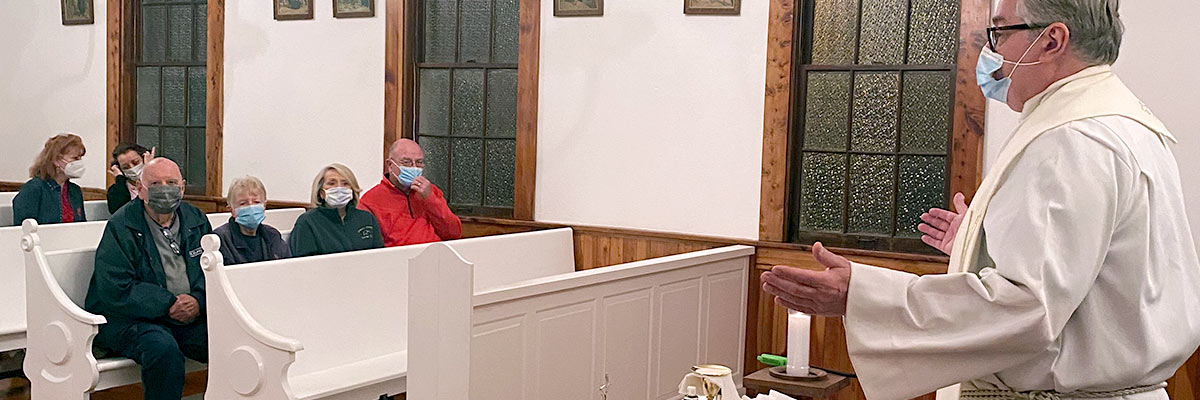Official Website of the
Catholic Diocese of Little Rock
Thanksgiving 2024
Published: November 25, 2024
Bishop Anthony B. Taylor preached the following homily during the Thanksgiving Mass for diocesan employees at St. John Catholic Center in Little Rock on Monday, Nov. 25, 2024.

Bishop Taylor
Scripture speaks about Thanksgiving in three different ways, one of which is bad and two of which are good, and all of which are present in one way or another in the way Thanksgiving Day is celebrated here in the United States.
First we have the wrong kind of "thanksgiving." The Pharisee who went to the temple to pray said "I give thanks, O God, that I am not like the rest of men ..." and especially not like that sinful tax collector. And isn't it true that as a nation we sometimes use Thanksgiving Day to compare ourselves favorably to others and to applaud our own accomplishments as a nation?
We congratulate ourselves that we are not like so many other people and so many other countries — crossing the line between gratitude and self-glorification. Said in the right spirit, "Thank God for America" can be a way of glorifying God for his many blessings to us, but said in the wrong spirit it can be an expression of nationalism that glorifies not God, but rather ourselves.
We need to open our eyes and see, open our hearts and feel, open our lips and say with Jesus, "Father, I thank you." The bottom line, that's what Thanksgiving is all about.
To hear some people talk, you'd think they were personally responsible for all the abundance that is here, not God. The Pharisee forgot that "from him to whom much has been given, much will be required" and we forget this too most glaringly these days in our nation's refusal to welcome refugees who are in very desperate circumstances.
Which is all the more scandalous because we ourselves are the descendants of immigrants and refugees — no one immigrates because things are going great in the old country. Much has been given to us, so much is expected of us.
Then we have two expressions of the right kind of thanksgiving. St. Paul who takes us to a higher level in his letter to the Philippians (1:3), saying "I thank God every time I remember you." That's where all genuine gratefulness begins — in remembrance. The self-made man forgets that the lion's share of our lives is heritage that has come to us through the goodness of God and the creative efforts of countless people, most of whom we don't even know.
Retrace mentally all that you have done today. You were awakened by an alarm clock originally invented by a Swiss mechanic. You crawled out from between sheets made from cotton raised in the Arkansas Delta, your cereal came from an Oklahoma wheat field and your coffee from a Colombian plantation, and you put on clothes and shoes made by hands you've never seen.
You drove here in a car manufactured in Detroit or Japan. And just the privilege of being here, worshipping freely in our free country, has been inherited by us, paid for by some who sacrificed their best years — and even their life — and we received every bit of this as gift. "I thank God every time I remember you." We need to remember what Paul remembered, that our lives have been enriched by others in more ways than we will ever know.
And yet, there is a higher level of gratitude, where Jesus says: "Father, I thank you" (John 11:41) which, surprisingly, he said praying at the grave of a friend. Of course, he said it other times too because gratitude to the Father was the very atmosphere out of which he lived his life.
Jesus saw the hand of his Father everywhere — feeding the birds of the air, dressing the flowers of the field, meeting the needs of his children and yes, he is there especially in our most difficult moments ... at the grave of a friend. And yet we forget this, we take it for granted.
The sun shines every day and the moon every night, so we think little about it. If it happened just once a year, we'd all pay admission to see the spectacular sight. Like spoiled children, we grow accustomed to our Father's abundance and forget how fortunate we really are.
Children usually learn that when they leave home and get out on their own. The problem is that God never really puts you and me completely out on our own, so we have to learn it some other way.
We need to open our eyes and see, open our hearts and feel, open our lips and say with Jesus, "Father, I thank you." The bottom line, that's what Thanksgiving is all about.









